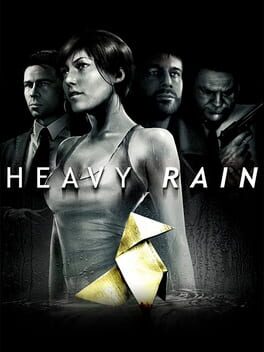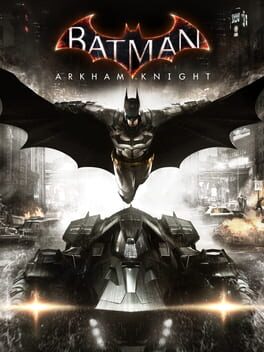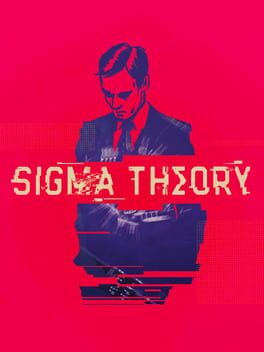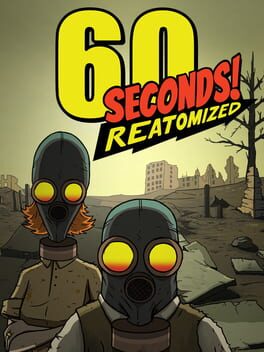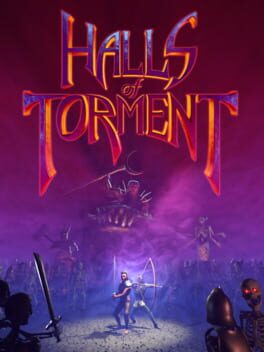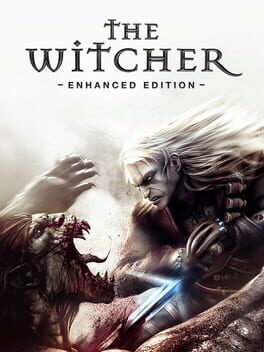yabbieman
Bio
Nothing here!
Badges

GOTY '23
Participated in the 2023 Game of the Year Event

On Schedule
Journaled games once a day for a week straight

Gamer
Played 250+ games

N00b
Played 100+ games
Favorite Games
366
Total Games Played
000
Played in 2024
046
Games Backloggd
Recently Played See More
Recently Reviewed See More
I am not the biggest fan of this game. As a seasoned player of RPG classics such as the Dragon Age series, the original Baldur's Gate, and Age of Decadence, my experience with this game left me with mixed feelings.
One glaring issue that significantly hampered my enjoyment was the subpar user interface. Navigating it is bizarre, as sorting options are limited to the value of items, weight, latest, and type. The inconsistency in the "type" sorting is particularly frustrating. Despite Skyrim's UI often facing criticism, it seems leagues better than Baldur's Gate 3, where viewing items by type is a challenge.
Dragon Age Origins successfully implemented DnD type gameplay in real time with occasional pausing, avoiding the turn-based approach that elongates this already lengthy game. The reliance on random dice gameplay not only disrupts the flow but actively encourages savescumming, diminishing the weight of decisions and combat encounters. While the game aims to emulate DnD, it should prioritize being enjoyable as a video game. Relying on virtual dice feels unnecessary; a more engaging alternative, such as a lockpicking minigame rather than dice rolls, would better suit the medium and enhance player enjoyment.
The game's potential is further hindered by a multitude of bugs, with at least three quests in Act 3 I could not complete due to technical issues. These bugs made it challenging to fully engage with the narrative, locking me out of completing it fully.
Certain combat encounters proved not only unfun but also unfairly challenging, pushing me to exploit bugs, like placing down a wall of fire which caused the enemy to skip their turn. The necessity of employing such tactics indicates a lack of balance in the design, detracting from the intended challenge and enjoyment of the fights.
One quest includes a chess puzzle, raising concerns about accessibility. Players should not feel compelled to master a separate game (Chess) to progress in a video game, potentially alienating those who may not be well-versed in chess strategy.
Despite my desire to play a paladin saving the realm, the game's significant focus on sex, with the majority of companions having an overtly sexual nature, was off-putting. The absence of a human female romance option raises questions about the developers intentions, giving the impression of an interspecies agenda.
Act 3 is both the highlight and downfall of Baldur's Gate 3. While it delivers excitement, it is ruined by imbalances and an abundance of bugs in this particular act. The thrill of progression is frequently overshadowed by the frustration of dealing with unaddressed issues.
One glaring issue that significantly hampered my enjoyment was the subpar user interface. Navigating it is bizarre, as sorting options are limited to the value of items, weight, latest, and type. The inconsistency in the "type" sorting is particularly frustrating. Despite Skyrim's UI often facing criticism, it seems leagues better than Baldur's Gate 3, where viewing items by type is a challenge.
Dragon Age Origins successfully implemented DnD type gameplay in real time with occasional pausing, avoiding the turn-based approach that elongates this already lengthy game. The reliance on random dice gameplay not only disrupts the flow but actively encourages savescumming, diminishing the weight of decisions and combat encounters. While the game aims to emulate DnD, it should prioritize being enjoyable as a video game. Relying on virtual dice feels unnecessary; a more engaging alternative, such as a lockpicking minigame rather than dice rolls, would better suit the medium and enhance player enjoyment.
The game's potential is further hindered by a multitude of bugs, with at least three quests in Act 3 I could not complete due to technical issues. These bugs made it challenging to fully engage with the narrative, locking me out of completing it fully.
Certain combat encounters proved not only unfun but also unfairly challenging, pushing me to exploit bugs, like placing down a wall of fire which caused the enemy to skip their turn. The necessity of employing such tactics indicates a lack of balance in the design, detracting from the intended challenge and enjoyment of the fights.
One quest includes a chess puzzle, raising concerns about accessibility. Players should not feel compelled to master a separate game (Chess) to progress in a video game, potentially alienating those who may not be well-versed in chess strategy.
Despite my desire to play a paladin saving the realm, the game's significant focus on sex, with the majority of companions having an overtly sexual nature, was off-putting. The absence of a human female romance option raises questions about the developers intentions, giving the impression of an interspecies agenda.
Act 3 is both the highlight and downfall of Baldur's Gate 3. While it delivers excitement, it is ruined by imbalances and an abundance of bugs in this particular act. The thrill of progression is frequently overshadowed by the frustration of dealing with unaddressed issues.
The Witcher 1: A Hidden Gem That Outshines The Witcher 3
Within the captivating world of The Witcher franchise, where epic tales and unforgettable characters take centre stage, The Witcher 1 stands as a true classic. The review will explore the exceptional storytelling, deep gameplay mechanics, and enduring technical qualities that make The Witcher 1 a remarkable experience. The Witcher 1's strengths will be highlighted, as they often shine brighter in comparison to its successor, The Witcher 3. The review will make it clear that The Witcher 1 is a magnum opus in its own right, setting a high bar for storytelling in the gaming world.
Story and Characters
The Witcher 1 excels at storytelling, with a highly intricate and captivating narrative that draws you in from the very beginning. It's a tale of political intrigue, moral dilemmas, and personal struggles that will keep you on the edge of your seat. While The Witcher 3 offers a fairly captivating narrative, its tendency to frequently shift the player to different locations can at times lead to a diminished emotional connection with the characters in each area. This constant change may inadvertently reduce the depth of the player's relationships with the characters, making it more challenging to form lasting bonds with them as compared to the more focused storytelling of The Witcher 1.
The Witcher 1's narrative, primarily centered within the confines of Vizima, is notably more contained and focused. This deliberate choice allows players to spend a significant amount of time with familiar characters, granting them the luxury of deeper connections and affording more time for character development. The confined setting creates a sense of intimacy that encourages players to truly invest in the lives, struggles, and growth of the characters, fostering a more profound narrative experience.
The character development in The Witcher 1 is nothing short of remarkable. Geralt, our stoic yet multifaceted protagonist, is portrayed in a way that invites players to explore the depths of his character. His unique position of having amnesia provides an intriguing lens through which players learn more about his past and motivations. This amnesia serves as a catalyst for self-discovery, both for Geralt and the player, adding layers of mystery and personal investment to the narrative. As you gradually piece together Geralt's history and identity, you become more emotionally attached to his journey.
The supporting cast in The Witcher 1 is equally captivating. Characters like Triss, Dandelion, Zoltan, Shani and Siegfried of Denesle are not merely sidekicks but fully realized individuals with their own intricate backgrounds and personalities. Each of them has their moments to shine, contributing to the game's depth and creating a more immersive and emotionally resonant experience.
The first Witcher game introduces players to the gritty and realistic world of Temeria with meticulous attention to detail. While The Witcher 3 offers a vast and open world, much of it is empty space or repetitive monster nests. The smaller and more concentrated areas in The Witcher 1 allow for a more intimate understanding of the world, making every corner feel unique and significant.
The Witcher 1 stands out for its ability to deliver a storytelling experience where player choices have profound and lasting consequences. The decisions you make throughout the game often lead to unexpected and far-reaching outcomes, creating a world that genuinely reacts to your choices. Every action, every dialogue option, every moral dilemma carries significant weight and shapes the narrative in unique ways. This level of agency allows players to craft their own personal journey within the game.
In contrast, The Witcher 3 occasionally constrains the player's agency by guiding the narrative along a more linear path. Some pivotal moments and character fates are more predetermined, reducing the scope of player influence. While this approach streamlines the storytelling and ensures a more cinematic experience, it does come at the expense of the open-ended, consequence-driven storytelling that defines The Witcher 1. Players who appreciate the depth of choice and their far-reaching impacts may find The Witcher 1's narrative structure more satisfying, as it grants them a deeper sense of authorship over the story and a more authentic role as Geralt in a dynamic, evolving world.
Gameplay
The combat system in The Witcher 1 often goes underappreciated, yet it's a hidden gem in the series, offering a level of depth and satisfaction that surpasses its successor, The Witcher 3. While The Witcher 3's combat is undeniably fast-paced, it can sometimes feel repetitive and formulaic, relying on a cycle of attacking, dodging, and spamming the quen sign.
In contrast, The Witcher 1 presents a more thoughtful, tactical, and strategic approach to combat. Players must master different combat styles, alchemy, and the use of signs, creating a multifaceted experience that challenges both their wits and skills. This complexity adds layers of depth to battles, making every encounter feel like a unique puzzle to solve, rather than a routine engagement. The satisfaction of mastering these systems and using them strategically in The Witcher 1 is unparalleled, turning combat into a true art. It's a refreshing departure from the potentially monotonous battles in The Witcher 3, where the thrill of combat can occasionally wane due to the repetitive nature. In The Witcher 1, each fight is a genuine test of your abilities and wit, ensuring that every battle is a rewarding and engaging experience that truly sets it apart from its acclaimed successor.
Aside from the combat, The Witcher 1 offers a more intricate alchemy system. Players must gather ingredients, brew potions, and manage their toxicity levels meticulously. This system encourages thoughtful planning before heading into battles and rewards players who invest time in mastering it. In contrast, The Witcher 3 simplifies the alchemy system, making it more accessible but potentially less engaging for players who appreciate the depth and challenge of alchemy in the first game. The complexity of alchemy in The Witcher 1 adds an extra layer of strategy and immersion to the gameplay.
Despite being smaller than the Witcher 3, the world of Witcher 1 feels far more open and encourages exploration in comparison to the Witcher 3. In the Witcher 1 players are free to tackle a wide variety of enemies and quests, regardless of their character's level. This approach encourages exploration, experimentation, and a sense of freedom in how players choose to engage with the game's world and challenges. In contrast, The Witcher 3 employs a level-gating system, which restricts players from taking on certain quests or enemies until they reach a specified level. While this approach can create a sense of progression, it can also limit the player's freedom and exploration, making The Witcher 1's more open structure appealing to those who prefer to shape their own adventures and challenges.
Technical
The graphics in The Witcher 1, though dated, stand as a testament to timeless artistry. The game's unique, gritty, and dark visual style immerses players in a world that doesn't rely on the superficial dazzle of photorealism or cutting-edge technology that the Witcher 3 uses. This enduring aesthetic charm is a masterstroke of storytelling, allowing the game to be just as immersive and captivating today as it was upon its initial release. In stark contrast, The Witcher 3, while visually stunning, often feels like it leans too heavily on its cutting-edge graphics. Its breathtaking environments and character models, while initially awe-inspiring, risk being mere eye candy, shackled to the latest graphical advancements. This reliance on top-tier graphics leaves The Witcher 3 vulnerable to feeling visually outdated as technology evolves, especially when measured against its predecessor, The Witcher 1.
The Witcher 1's unwavering commitment to its atmospheric and storytelling focused artistry, is a testament to its enduring appeal. This stark contrast with The Witcher 3's graphical dependency underscores the superior artistry of the first installment, which transcends the limitations of its visuals to deliver an experience that continues to captivate players in ways that its successor often fails to match.
The stability of this game is often criticized for its occasional crashes, but within these crashes lies an unexpected delight. They serve as a stark reminder to appreciate those moments when the game runs smoothly. In my quest to explore fixes for these crashes, I turned to the game's community and found a supportive, welcoming environment that made me feel like I truly belonged. This sense of community and camaraderie is an experience that eludes many modern games.
Dealing with these crashes wasn't just a test of patience; it also acted as a catalyst for improving my problem-solving skills. The occasional interruptions encouraged me to take a break from the game, a refreshing departure from the relentless push for extended gameplay sessions. This subtle encouragement to value my time and enjoy life beyond the game is a rarity in the world of modern gaming.
In contrast to The Witcher 1's occasional crashes that brought unexpected delight and fostered a sense of camaraderie within its community, The Witcher 3, though a magnificent game in its own right, sometimes falls short in these aspects. The Witcher 3, while more stable overall, misses the chance to encourage player engagement during moments of instability. Additionally, The Witcher 3's sprawling, open-world design often prioritizes extended gameplay sessions over having a break, contributing to a sense of relentless push to keep players engaged with mediocre content. This can lead to an inadvertent neglect of the value of time and the importance of balancing gaming with other aspects of life, a departure from the gentle reminders found in The Witcher 1.
The stability of The Witcher 1 is a masterclass in making players appreciate moments of instability, enhancing problem-solving skills, and encouraging time management. The sense of community and the occasional nudge to take a break are experiences that few games manage to capture in today's gaming landscape.
In summary, The Witcher 1 surpasses its successor, The Witcher 3, in storytelling, character depth, immersive world-building, and combat depth. It excels in creating lasting emotional connections with its characters, showcasing that sometimes, the original can outshine even the most beloved sequels. The game's strengths lie in its intricate narrative, character development, and immersive world, setting a high bar for storytelling in the gaming world. Its unique combat system, rich alchemy mechanics, and the depth of choice and consequence in the narrative outshine The Witcher 3. However, occasional stability issues may challenge some players, but these setbacks foster a sense of community and encouragement to appreciate life beyond the game.
The Witcher 1 is the game of choice for discerning gamers who value deep storytelling and character immersion, setting an exceptional standard that its successor, The Witcher 3, often fails to meet. Unlike The Witcher 3, which frequently sacrifices character depth and narrative focus due to its shifting locations, The Witcher 1's meticulously contained narrative encourages players to form profound emotional connections with its characters. The complexity of combat and the meaningful consequences of player choices within The Witcher 1 stand in stark contrast to The Witcher 3's more linear approach, where such depth is often sacrificed for a more cinematic experience. In essence, The Witcher 1 is the true gem in the series, outshining its successor in almost every aspect.
Within the captivating world of The Witcher franchise, where epic tales and unforgettable characters take centre stage, The Witcher 1 stands as a true classic. The review will explore the exceptional storytelling, deep gameplay mechanics, and enduring technical qualities that make The Witcher 1 a remarkable experience. The Witcher 1's strengths will be highlighted, as they often shine brighter in comparison to its successor, The Witcher 3. The review will make it clear that The Witcher 1 is a magnum opus in its own right, setting a high bar for storytelling in the gaming world.
Story and Characters
The Witcher 1 excels at storytelling, with a highly intricate and captivating narrative that draws you in from the very beginning. It's a tale of political intrigue, moral dilemmas, and personal struggles that will keep you on the edge of your seat. While The Witcher 3 offers a fairly captivating narrative, its tendency to frequently shift the player to different locations can at times lead to a diminished emotional connection with the characters in each area. This constant change may inadvertently reduce the depth of the player's relationships with the characters, making it more challenging to form lasting bonds with them as compared to the more focused storytelling of The Witcher 1.
The Witcher 1's narrative, primarily centered within the confines of Vizima, is notably more contained and focused. This deliberate choice allows players to spend a significant amount of time with familiar characters, granting them the luxury of deeper connections and affording more time for character development. The confined setting creates a sense of intimacy that encourages players to truly invest in the lives, struggles, and growth of the characters, fostering a more profound narrative experience.
The character development in The Witcher 1 is nothing short of remarkable. Geralt, our stoic yet multifaceted protagonist, is portrayed in a way that invites players to explore the depths of his character. His unique position of having amnesia provides an intriguing lens through which players learn more about his past and motivations. This amnesia serves as a catalyst for self-discovery, both for Geralt and the player, adding layers of mystery and personal investment to the narrative. As you gradually piece together Geralt's history and identity, you become more emotionally attached to his journey.
The supporting cast in The Witcher 1 is equally captivating. Characters like Triss, Dandelion, Zoltan, Shani and Siegfried of Denesle are not merely sidekicks but fully realized individuals with their own intricate backgrounds and personalities. Each of them has their moments to shine, contributing to the game's depth and creating a more immersive and emotionally resonant experience.
The first Witcher game introduces players to the gritty and realistic world of Temeria with meticulous attention to detail. While The Witcher 3 offers a vast and open world, much of it is empty space or repetitive monster nests. The smaller and more concentrated areas in The Witcher 1 allow for a more intimate understanding of the world, making every corner feel unique and significant.
The Witcher 1 stands out for its ability to deliver a storytelling experience where player choices have profound and lasting consequences. The decisions you make throughout the game often lead to unexpected and far-reaching outcomes, creating a world that genuinely reacts to your choices. Every action, every dialogue option, every moral dilemma carries significant weight and shapes the narrative in unique ways. This level of agency allows players to craft their own personal journey within the game.
In contrast, The Witcher 3 occasionally constrains the player's agency by guiding the narrative along a more linear path. Some pivotal moments and character fates are more predetermined, reducing the scope of player influence. While this approach streamlines the storytelling and ensures a more cinematic experience, it does come at the expense of the open-ended, consequence-driven storytelling that defines The Witcher 1. Players who appreciate the depth of choice and their far-reaching impacts may find The Witcher 1's narrative structure more satisfying, as it grants them a deeper sense of authorship over the story and a more authentic role as Geralt in a dynamic, evolving world.
Gameplay
The combat system in The Witcher 1 often goes underappreciated, yet it's a hidden gem in the series, offering a level of depth and satisfaction that surpasses its successor, The Witcher 3. While The Witcher 3's combat is undeniably fast-paced, it can sometimes feel repetitive and formulaic, relying on a cycle of attacking, dodging, and spamming the quen sign.
In contrast, The Witcher 1 presents a more thoughtful, tactical, and strategic approach to combat. Players must master different combat styles, alchemy, and the use of signs, creating a multifaceted experience that challenges both their wits and skills. This complexity adds layers of depth to battles, making every encounter feel like a unique puzzle to solve, rather than a routine engagement. The satisfaction of mastering these systems and using them strategically in The Witcher 1 is unparalleled, turning combat into a true art. It's a refreshing departure from the potentially monotonous battles in The Witcher 3, where the thrill of combat can occasionally wane due to the repetitive nature. In The Witcher 1, each fight is a genuine test of your abilities and wit, ensuring that every battle is a rewarding and engaging experience that truly sets it apart from its acclaimed successor.
Aside from the combat, The Witcher 1 offers a more intricate alchemy system. Players must gather ingredients, brew potions, and manage their toxicity levels meticulously. This system encourages thoughtful planning before heading into battles and rewards players who invest time in mastering it. In contrast, The Witcher 3 simplifies the alchemy system, making it more accessible but potentially less engaging for players who appreciate the depth and challenge of alchemy in the first game. The complexity of alchemy in The Witcher 1 adds an extra layer of strategy and immersion to the gameplay.
Despite being smaller than the Witcher 3, the world of Witcher 1 feels far more open and encourages exploration in comparison to the Witcher 3. In the Witcher 1 players are free to tackle a wide variety of enemies and quests, regardless of their character's level. This approach encourages exploration, experimentation, and a sense of freedom in how players choose to engage with the game's world and challenges. In contrast, The Witcher 3 employs a level-gating system, which restricts players from taking on certain quests or enemies until they reach a specified level. While this approach can create a sense of progression, it can also limit the player's freedom and exploration, making The Witcher 1's more open structure appealing to those who prefer to shape their own adventures and challenges.
Technical
The graphics in The Witcher 1, though dated, stand as a testament to timeless artistry. The game's unique, gritty, and dark visual style immerses players in a world that doesn't rely on the superficial dazzle of photorealism or cutting-edge technology that the Witcher 3 uses. This enduring aesthetic charm is a masterstroke of storytelling, allowing the game to be just as immersive and captivating today as it was upon its initial release. In stark contrast, The Witcher 3, while visually stunning, often feels like it leans too heavily on its cutting-edge graphics. Its breathtaking environments and character models, while initially awe-inspiring, risk being mere eye candy, shackled to the latest graphical advancements. This reliance on top-tier graphics leaves The Witcher 3 vulnerable to feeling visually outdated as technology evolves, especially when measured against its predecessor, The Witcher 1.
The Witcher 1's unwavering commitment to its atmospheric and storytelling focused artistry, is a testament to its enduring appeal. This stark contrast with The Witcher 3's graphical dependency underscores the superior artistry of the first installment, which transcends the limitations of its visuals to deliver an experience that continues to captivate players in ways that its successor often fails to match.
The stability of this game is often criticized for its occasional crashes, but within these crashes lies an unexpected delight. They serve as a stark reminder to appreciate those moments when the game runs smoothly. In my quest to explore fixes for these crashes, I turned to the game's community and found a supportive, welcoming environment that made me feel like I truly belonged. This sense of community and camaraderie is an experience that eludes many modern games.
Dealing with these crashes wasn't just a test of patience; it also acted as a catalyst for improving my problem-solving skills. The occasional interruptions encouraged me to take a break from the game, a refreshing departure from the relentless push for extended gameplay sessions. This subtle encouragement to value my time and enjoy life beyond the game is a rarity in the world of modern gaming.
In contrast to The Witcher 1's occasional crashes that brought unexpected delight and fostered a sense of camaraderie within its community, The Witcher 3, though a magnificent game in its own right, sometimes falls short in these aspects. The Witcher 3, while more stable overall, misses the chance to encourage player engagement during moments of instability. Additionally, The Witcher 3's sprawling, open-world design often prioritizes extended gameplay sessions over having a break, contributing to a sense of relentless push to keep players engaged with mediocre content. This can lead to an inadvertent neglect of the value of time and the importance of balancing gaming with other aspects of life, a departure from the gentle reminders found in The Witcher 1.
The stability of The Witcher 1 is a masterclass in making players appreciate moments of instability, enhancing problem-solving skills, and encouraging time management. The sense of community and the occasional nudge to take a break are experiences that few games manage to capture in today's gaming landscape.
In summary, The Witcher 1 surpasses its successor, The Witcher 3, in storytelling, character depth, immersive world-building, and combat depth. It excels in creating lasting emotional connections with its characters, showcasing that sometimes, the original can outshine even the most beloved sequels. The game's strengths lie in its intricate narrative, character development, and immersive world, setting a high bar for storytelling in the gaming world. Its unique combat system, rich alchemy mechanics, and the depth of choice and consequence in the narrative outshine The Witcher 3. However, occasional stability issues may challenge some players, but these setbacks foster a sense of community and encouragement to appreciate life beyond the game.
The Witcher 1 is the game of choice for discerning gamers who value deep storytelling and character immersion, setting an exceptional standard that its successor, The Witcher 3, often fails to meet. Unlike The Witcher 3, which frequently sacrifices character depth and narrative focus due to its shifting locations, The Witcher 1's meticulously contained narrative encourages players to form profound emotional connections with its characters. The complexity of combat and the meaningful consequences of player choices within The Witcher 1 stand in stark contrast to The Witcher 3's more linear approach, where such depth is often sacrificed for a more cinematic experience. In essence, The Witcher 1 is the true gem in the series, outshining its successor in almost every aspect.
An intriguing experience with some intense moments. The game has a resource management system with stamina, its simple, but pleasantly straightforward. However, the experience becomes repetitive over time due to encountering the same people repeatedly. The most engaging part of the game was how your choices shape the story, which kept me fully engaged.
